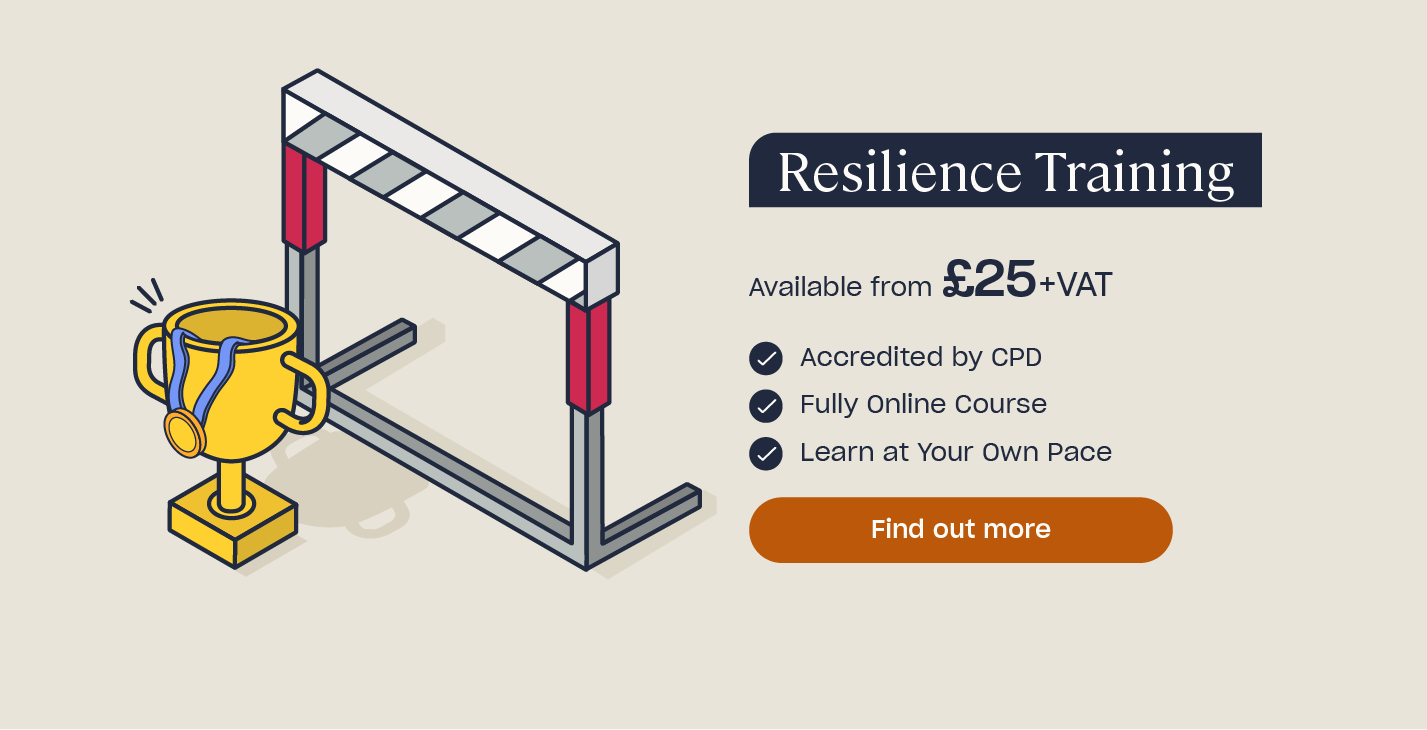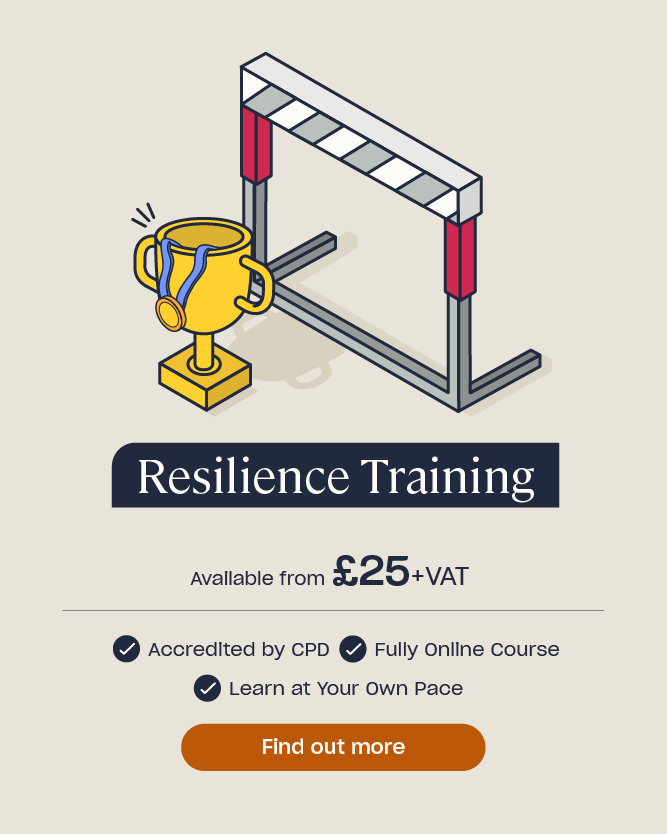How to Build Resilience in Healthcare Professionals
The health and social care sector is a high-pressure environment due to a multitude of factors. Increased demand on services, lack of funding and a high staff turnover are just a few issues that are contributing to staffing levels not meeting the demands of services and leading the industry to hit a crisis.
In order to reduce the high turnover of staff, increasing resilience and decreasing burnout are incredibly important and could prevent the predicted crisis. This article outlines the causes of burnout and strategies to prevent it, as well as explaining why resilience is so important in health and social care and how to build resilience skills.
What are the Causes of Burnout in Health and Social Care?
Burnout is a state of emotional, physical and mental exhaustion caused by excessive and prolonged work-related stress. It usually occurs when you feel overwhelmed and unable to meet constant demands and is very common in the health and social care industry. Despite being highly prevalent within the sector, there are a lack of resources available to help people suffering with burnout, which is a contributing factor to the high levels among staff.
A report from the Health and Social Care Select Committee shows high levels of burnout among healthcare workers. It explains that this is due to the stresses of the COVID-19 pandemic, low pay and recognition, high levels of staff turnover and vacancies, as well as poor planning from the government.
Another report showed that NHS staff are 50% more likely than the general public to experience work-related stress, with 44% of NHS staff reporting feeling unwell as a result of said stress. These figures have risen since the COVID-19 pandemic, with higher rates of mental health symptoms among care workers. It also reported that with those with a history of mental health conditions were most at risk.

Taking steps to prevent burnout is essential as it can contribute to low morale, errors and misjudgements, which affect the quality of care people receive.
Common reasons for burnout include:
- Unfair treatment at work.
- Having an unmanageable workload.
- A lack of role clarity.
- A lack of communication and support from managers.
- Unreasonable time pressures.
Why is Resilience Important in Healthcare?
Resilience is defined as the ability to maintain personal wellbeing in the face of challenge and is an important personal attribute for workers in the health and social care sector.
Despite the importance of resilience in health and social care, it is currently a skills gap within employees. This is increasingly alarming as resilience can have an impact on emotional and psychological wellbeing, and consequently helps reduce the risk of employees experiencing burnout.
Resilience can also increase empathy and compassion; it enables people to reconnect with the joy and purpose of practice, sometimes even reminding them why they chose a career in health and social care. It also helps workers manage stressful situations, promote positive mental health and essentially, focuses on healthcare professionals being able to provide high-quality care.
Where staff resilience is poor, there are often more problems with sickness absence, slow working and ineffective communication between patients and staff. Therefore, one of the key elements to maintaining the quality and safety of care is through building resilience in healthcare professionals.

Examples of Resilience
Resilient workers can be recognised by a few characteristics, including:
- Their ability to engage with, and utilise, others for their own support and development.
- Their composure and management of negative emotions.
- Their use of control whilst accepting external controls.
- Their ability to learn from past experiences.
- Their perseverance and commitment to their role.
- Their coordination and use of planning.
- Their confidence and self-efficacy.
How Can Health and Social Care Employers Help to Prevent Burnout?
Burnout is usually considered an individual problem only solvable by that person making changes in their life. However, emerging evidence has shifted the responsibility away from the individual and towards the workplace environment.
Rather than looking at burnout as an employee’s personal problem, it should be viewed as the responsibility of the organisation that employs them. As previously mentioned, the causes of burnout demonstrate that the root of the problem lies with the employer and the work environment they have created.
With that said, it is also important to note that, unfortunately, it is impossible to ensure that work environments are not stressful at all due to the nature of the industry. However, employers should take the necessary steps to recognise burnout and encourage resilience.
This can be done in a number of ways, including:
- Creating a realistic, compassionate, open team culture and having honest conversations with employees.
- Being vigilant and alert to risks as well as monitoring any potential indicators of burnout.
- Having regular, managed timeouts to discuss problems and the work/life balance.
- Shared responsibility to identify sources of stress and put appropriate measures in place.
- Having clear support and confidentiality policies as well as access to external support services.
- Ensuring staff are registered with a GP.
Interested in learning more?
Resilience is vital to success in the workplace and is a key skill for employees. Take a look at our Resilience Training Course to help you build your personal resilience and understand why it is so important.
There is a shared responsibility to recognise and address signs of stress in a colleague or employee. The earlier the problem is tackled, the less impact it will have. If you notice that someone appears to be suffering from work-related stress or burnout, the first step to helping them is starting a conversation.
The Health and Safety Executive have guidelines on how to hold initial conversations with employees or colleagues about stress that could make an enormous difference in your colleague’s life. They state that by taking action, employers can help create a more engaged, healthy workforce, boost productivity and save money.
Strategies for Building Resilience Skills in Healthcare Professionals
As a worker in health and social care it is important to build your own resilience separately from following the methods that have been put in place in your workplace.
Building personal resilience separate from your work life and as a point of personal development can help you feel confident within your role and profession. Furthermore, it can move forward with you if you enter further roles and as you progress throughout your career in health and social care.

Strategies for building resilience as an employer include:
- Recruitment based on personal values.
- Thorough induction and onboarding processes.
- Having stress management resources available.
- Encouraging learning and development.
- Organising health and wellbeing initiatives.
- Working in a way that protects the wellbeing of your staff.
- Raising awareness of stress and how to manage it.
- Ensuring systems are in place to identify, investigate and resolve problems.
Strategies for building resilience as an employee include:
- Dealing with pressure through relaxation techniques, mindfulness, self-care and time management.
- Developing team working skills through communication and emotional intelligence.
- Developing problem solving and critical thinking skills.
- Engaging in reflective practice.
- Seeking and utilising sources of support.
- Developing self-efficacy skills such as self-awareness and confidence building.
As well as having separate responsibilities outlined for employers and employees, it is important to note that learning as a team is also encouraged. Working as a team in health and social care environments is of the upmost importance and can embed resilient behaviours as ‘the norm’ in your workplace.
Another strategy to build resilience in healthcare professionals is implementing one-to-one conversations. Encouraging discussion around the positive and negative impacts of the role allows both employers and employees to reflect on what they can do in the future to improve.
A further important consideration is positive confrontation techniques as conflict can be detrimental to workplace morale. A few positive confrontation techniques to consider include acknowledging other points of view, being aware of emotions, focusing on the problem at hand and actively listening. For more information regarding how to manage conflict in health and social care, take a look at our dedicated article.
Building resilience in healthcare professionals contributes to positive workplace morale, high-quality care and a reduced risk of staff burnout. There are a multitude of strategies to increase resilience among staff including raising awareness of stress and how to manage it, encouraging learning and development, and working in a way that protects the wellbeing of your staff.
Further Resources:
- Resilience Training
- Resilience Quiz
- Resilience in the Workplace: What are the Benefits and How Can Businesses Develop It?
- How to Support Professional Development in Health and Social Care
- Guidance on Managing Conflict in Health and Social Care
- Champions in Healthcare: Roles and Responsibilities
- Using a Personal Development Plan in Health and Social Care
- Guidance on Complaints Procedures in Health and Social Care
- Personal Protective Equipment (PPE) in Healthcare Quiz
- Safeguarding People Training Courses







